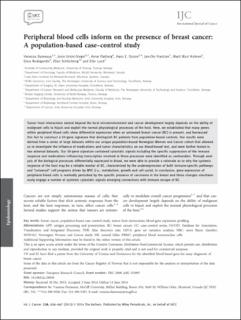| dc.contributor.author | Dumeaux, Vanessa | |
| dc.contributor.author | Ursini‐Siegel, Josie | |
| dc.contributor.author | Flatberg, Arnar | |
| dc.contributor.author | Fjøsne, Hans Erikssønn | |
| dc.contributor.author | Frantzen, Jan Ole | |
| dc.contributor.author | Holmen, Marit Muri | |
| dc.contributor.author | Rodegerdts, Enno | |
| dc.contributor.author | Schlichting, Ellen | |
| dc.contributor.author | Lund, Eiliv | |
| dc.date.accessioned | 2022-11-29T07:23:05Z | |
| dc.date.available | 2022-11-29T07:23:05Z | |
| dc.date.created | 2014-10-16T14:32:22Z | |
| dc.date.issued | 2015 | |
| dc.identifier.citation | International Journal of Cancer. 2015, 136 (3), 656-667. | en_US |
| dc.identifier.issn | 0020-7136 | |
| dc.identifier.uri | https://hdl.handle.net/11250/3034607 | |
| dc.description.abstract | Tumor–host interactions extend beyond the local microenvironment and cancer development largely depends on the ability of malignant cells to hijack and exploit the normal physiological processes of the host. Here, we established that many genes within peripheral blood cells show differential expression when an untreated breast cancer (BC) is present, and harnessed this fact to construct a 50-gene signature that distinguish BC patients from population-based controls. Our results were derived from a series of large datasets within our unique population-based Norwegian Women and Cancer cohort that allowed us to investigate the influence of medications and tumor characteristics on our blood-based test, and were further tested in two external datasets. Our 50-gene signature contained cytostatic signals including the specific suppression of the immune response and medications influencing transcription involved in those processes were identified as confounders. Through analysis of the biological processes differentially expressed in blood, we were able to provide a rationale as to why the systemic response of the host may be a reliable marker of BC, characterized by the underexpression of both immune-specific pathways and “universal” cell programs driven by MYC (i.e., metabolism, growth and cell cycle). In conclusion, gene expression of peripheral blood cells is markedly perturbed by the specific presence of carcinoma in the breast and these changes simultaneously engage a number of systemic cytostatic signals emerging connections with immune escape of BC. | en_US |
| dc.language.iso | eng | en_US |
| dc.publisher | Wiley | en_US |
| dc.rights | Navngivelse-Ikkekommersiell 4.0 Internasjonal | * |
| dc.rights.uri | http://creativecommons.org/licenses/by-nc/4.0/deed.no | * |
| dc.title | Peripheral blood cells inform on the presence of breast cancer: A population‐based case–control study | en_US |
| dc.title.alternative | Peripheral blood cells inform on the presence of breast cancer: A population‐based case–control study | en_US |
| dc.type | Journal article | en_US |
| dc.type | Peer reviewed | en_US |
| dc.description.version | publishedVersion | en_US |
| dc.source.pagenumber | 656-667 | en_US |
| dc.source.volume | 136 | en_US |
| dc.source.journal | International Journal of Cancer | en_US |
| dc.source.issue | 3 | en_US |
| dc.identifier.doi | 10.1002/ijc.29030 | |
| dc.identifier.cristin | 1164556 | |
| cristin.ispublished | true | |
| cristin.fulltext | original | |
| cristin.qualitycode | 2 | |

